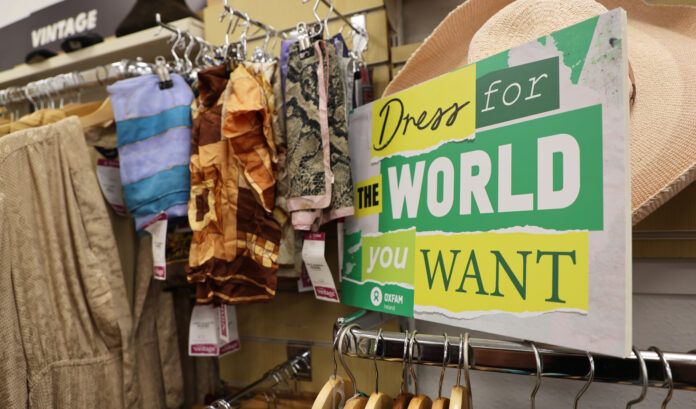
This month, the French Government announced that they would be launching a new initiative to make the fashion industry more sustainable, including encouraging people to donate or recycle unwanted clothes.
The innovative move will see France subsidise clothes and shoe repairs. Under the legislation, new clothes produced in France will also have to include environmental impact details on labels. This comes as figures show the average person in Europe throws away 11 kilograms of textiles every year.
The step made me question what role Ireland is playing when it comes to sustainability in fashion, which led to an enlightening conversation with Alice Dawson-Lyons, Head of Communications and Campaigns with Oxfam, one of the country’s leaders when it comes to second-hand shopping.
“One of the key objectives of our shops – including our shop on William Street in Limerick – is to divert items from landfill and reduce waste,” Alice shares.
One of the key pillars of the EU’s Green Deal is to improve access to longer-lasting products that can be repaired, recycled, and re-used. To support sustainable fashion in Ireland, there are calls on the Emerald Isle to invest more in the repairs industry.
And there is some good news here in Ireland as, according to Alice, Gen Z are getting more curious about slow fashion by challenging unsustainable clothing practices.
She explains that Oxfam has reported an increase in sales and interest from young people in their second-hand shops. According to research carried out by Swappie and Kantar, as a nation, 48 per cent of our population is now opting for second-hand products compared to the last five years.
Alice believes this stems from the younger generation seeing climate change as more serious than older cohorts.
“We believe this is because of their commitment to tackling the climate crisis and living in a more sustainable way. Over-production and over-consumption of clothes, shoes, and accessories are not sustainable.”
According to UN figures, the equivalent of one refuse truck full of clothes is burned or dumped in a landfill every second. “Many of our customers – across all ages – want to change this and be part of a fashion revolution that includes re-wearing and reusing,” Alice says.
“Charity shops have a huge role to play in making the fashion and textile industries more sustainable,” Alice claims. “They divert items from landfill, extending their life and reducing their carbon footprints.”
“WRAP, the UK’s Waste and Resources Action Programme, highlights how extending the life of clothes by an extra nine months of active use reduces their carbon, water, and waste footprints by around 20 to 30 per cent – and we know that people wear and enjoy pre-loved items for much longer than nine months.”
Urging people to visit their local charity shops, Alice says: “By buying and donating second-hand clothes with Oxfam, people are not only shopping more sustainably, they’re also raising money to support people facing the worst effects of the climate crisis.”
Each year, Oxfam Ireland runs a month-long initiative called Second-Hand September, encouraging people to shop more sustainably for the whole month and beyond.
“This year we’re coming together to dress for the world we want,” Alice enthuses. “Taking part in Oxfam’s Second-Hand September is a powerful way of recycling and buying stylish outfits that don’t cost the earth, all while making a statement about who we are and the world we want for everyone.”
Through their network of shops, Oxfam also works with organisations to help them meet their sustainability goals, for example, through their ‘Take Back’ scheme, which Alice describes as an easy and effective way to reduce the number of textiles going to landfill.
“It’s simple – employees bring their bags of unwanted items to work and drop them in the Oxfam Ireland donation bin on the way to their desk. We then collect the donated items, sort and dispatch them to our stores across Ireland, where they can be bought and given a second lease of life.”
The scheme also raises funds for Oxfam’s work worldwide, including with communities hardest hit by climate change.
Local sustainable fashionistas should keep an eye on OxfamIreland.org across August for more on how to get involved in Oxfam’s initiatives, or pop into the William Street location here in the Treaty City.










